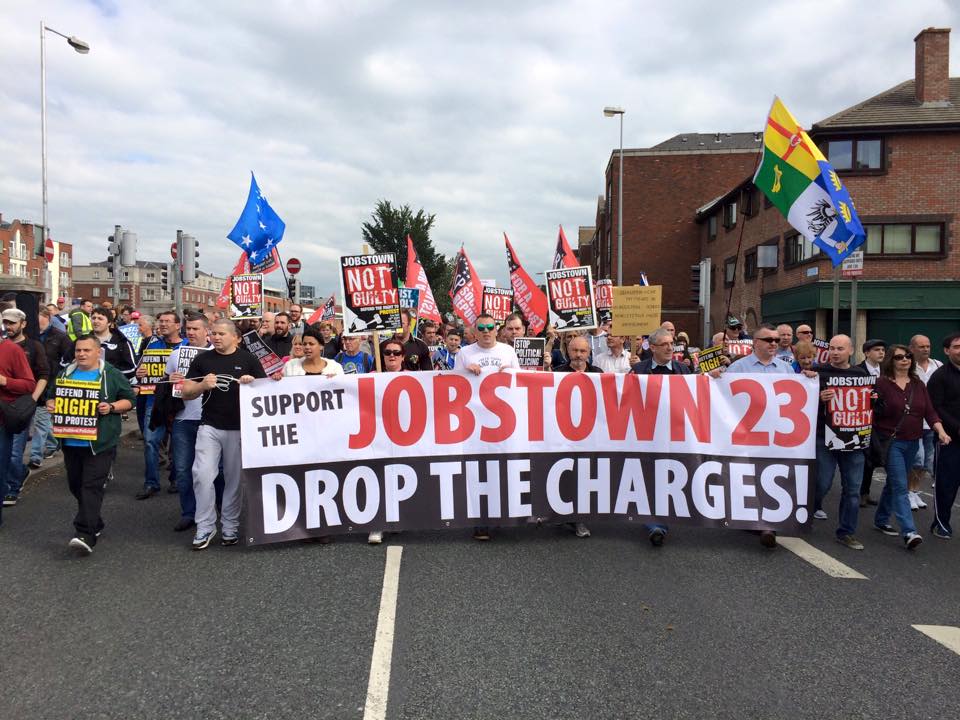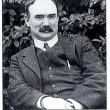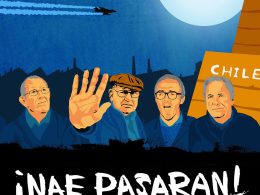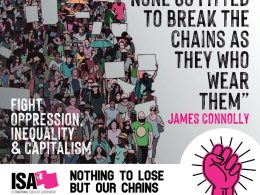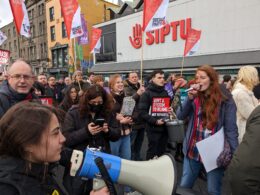“This public force exists in every state; it consists not merely of armed men, but also of material appendages, prisons and coercive institutions of all kinds…”
The ‘public force’ designed to protect the interests of the ruling class described in Friedrich Engels’ (Karl Marx’s lifelong collaborator) Origins of the Family Private Property and the State is on full display in Ireland today. From the black propaganda campaigns led by the Garda hierarchy to the trumped-up #JobstownNotGuilty charges, a light is being shone on the coercive nature of the capitalist state.
With the backdrop set by the scandalous treatment of Garda whistleblowers and the ongoing Charleton Inquiry, the trials of the adult #JobstownNotGuilty defendants will be historic. Legally, they will determine whether sit-down protests and slow marching will be redefined as false imprisonment and violent disorder. Politically, they will pit the state against a working class community and the Labour Party against the rising left.
Political Policing
When the spontaneous community protest took place in Jobstown in Tallaght on 15 November 2014, nobody would have predicted the series of dramatic events that would see dawn raids, extensive leaking, an effective trial by media, and 19 people facing trial on a variety of ‘false imprisonment’ and ‘violent disorder’ charges. This all happened because the ruling class in this country, and those who represent them at the top of the Garda Siochana and the government, became increasingly scared. Their preferred methods of rule, relying on ideology and the illusion of a neutral state and the ‘rule of law’ decided by a parliamentary majority, have been undermined, leading them to resort to naked state represssion.
When the defendants and Solidarity (formerly the Anti-Austerity Alliance) TDs amongst others used the phrase ‘political policing’ to describe what was happening, they were ridiculed in the media. Michael Clifford, who has been more sympathetic than most journalists, wrote in the Irish Examiner on 10 February 2015:
“[T]he allegation that what happened yesterday was political policing is outrageous. It infers that those pulling the strings in government are moronic. They couldn’t be that stupid. The only political capital generated yesterday was for the AAA, who, fair play to them, made serious hay.”
Shane Coleman in the Irish Indpendent on the same day was more forthright:
“Let’s get the nonsense out of the way first. Joe Higgins’ charge that it was “political policing” and the ‘Labour Party should answer for it’ is ludicrous and predictable. Equally silly is the claim that this is part of an ‘orchestrated attempt to damage the anti-water charges campaign’. There’s no basis to the notion that political forces were at play, forcing the hand of the Gardaí to act.”
Yet, if even 10% of the truth emerges, the charge of political policing will be unanswerable. That is policing which serves the interests of the political establishment and ruling class and is carried out with that political aim in mind. For this reason, the trial has the potential to cause a significant crisis of legitimacy for institutions of the state including the Gardaí. Convictions will rightly provoke anger and protest, with wide sections of society shocked that anybody could be convicted of false imprisonment or violent disorder because of participation in a peaceful protest. Acquittals will provoke a widespread questioning about why the state spent millions trying to victimise protesters.
Smearing a whistleblower
The first adult trial for false imprisonment will start on 24 April, with the tribunal into the smear campaign against Garda whistleblowers underway. These revelations shone a light onto the dirty side of the Garda hierarchy. Although the issues involved are different, the parallels are clear and the stories of political policing and black propaganda intersect with each other at a number of points. Central to both scandals is Garda Commissioner Nóirín O’Sullivan.
O’Sullivan rose through the Gardaí as part of what is known as the Special Branch. Operating out of Harcourt Street, they include the unit that is the Irish equivalent of MI5, Crime and Security – responsible for domestic state security. As well as targeting republican groups, they have a group which focuses on left-wing activists and parties. O’Sullivan became Assistant Commissioner in Crime and Security in June 2009.
Sergeant Maurice McCabe was villified as a result of blowing the whistle on a range of instances of Garda corruption. An allegation against him of the rape of a child was put onto a file in the state agency Tusla. That false allegation was then widely spread around political and media circles in order to discredit his revelations. O’Sullivan’s predecessor, Martin Callinan, personally met with the chair of the Public Accounts Committee, John McGuinness TD and falsely alleged that he had abused his own children. This campaign continued under Nóirín O’Sullivan’s instructions, including, allegedly, phone calls from her to journalists. During the O’Higgins Inquiry, her lawyers, acting under her instruction, attempted to bring in the false allegation of child abuse to undermine McCabe.
It is impossible to imagine a more disgusting allegation or smear campaign. Yet, this appears to have been a tried and tested method of damaging anybody who stepped out of line. Another Garda whistleblower, Keith Harrison also had a false allegation entered in a Tusla file against him. When then head of the Garda Press Office, Superintendenant Dave Taylor was arrested by O’Sullivan’s husband, Jim McGovern, his phones were confiscated. The false rumour was put about that child pornography had been found on them. After 22 months suspension, Taylor was cleared of the leaking allegations for which he was arrested.
The significance of these phones is that they potentially contain evidence that would be devastating to O’Sullivan. After Taylor texted her to tell her that Irish Independent crime correspondent, Paul Williams, had interviewed the victim in the false allegations, she reportedly texted back ‘perfect’. After being in the control of her husband for 22 months, what are the chances of this evidence remaining?
Water charges & Jobstown protests
On 11 October 2014, the anti-water charges movement exploded onto the streets with 100,000 marching in Dublin. Simultaneously, the Anti-Austerity Alliance won the by-election in Dublin South West in an election dominated by water charges, with the call for mass civil disobedience through non-payment being a key factor to my election. Three weeks later, up to 150,000 marched with unprecedented local demonstrations, with an estimated 3,000 in Tallaght. Water meter installation was increasingly being met by determined and effective opposition in working class communities in Dublin and Cork. The government was clearly under massive pressure.
The Jobstown protest happened on 15 November 2014. It encapsulated everything which the ruling class feared – a previously Labour Party supporting area having the temerity to engage in spontaneous protest against the Labour leader and Tanáiste, to express anger and to carry out civil disobedience in the form of sit-down protests and slow marches. They feared it, and they also saw it as an opportunity to try to divide the anti-water charges movement, by portraying a violent protest. The media went into overdrive, with the hysteria best encapsulated by the Daily Mail’s frontpage headline on 18 November: “’Democrats’ who believe in mob rule” – referring to Ruth Coppinger TD and myself.
In this context, a decision was made to proceed with a ‘false imprisonment’ investigation, establish an incident room in Tallaght and allocate four Gardaí to work full-time on it. Given the high profile nature of the case and the fact that ‘false imprisonment’ charges had never before been pressed against protesters, it seems highly likely that this discussion went to the very top of the Gardaí.
The timing here is telling. On the day of the protest, O’Sullivan was acting as interim Commissioner, after her predecessor was effectively sacked by the Taoiseach for one scandal too many. Ten days after the protest, she was appointed as Commissioner. It seems that she decided this was a golden opportunity to deal a blow against the anti-water charges movement and left and ingratiate herself with the government, whose TDs were already talking about ‘false imprisonment’.
“Embedded journalism”
These investigations continued over months. Then on 9 February 2015, the infamous dawn raids took place. Within an hour, they were being reported on RTE by a breathless crime correspondent, Paul Reynolds. The same journalist appeared on RTE 9 O’Clock news on 12 August to reveal that, contrary to a press report, false imprisonment charges would be brought forward. The first any defendants heard this was on RTE.
A month later, on 11 September, Reynolds for the third time proved to be ahead of the story. I received a brief phone call from him telling me that I was due to be arrested. That was followed by a voicemail to Solidarity Councillor Kieran Mahon telling him the same. The other defendants got no such warning. Then Reynolds went on the 6.1 news and announced we would be charged with false imprisonment. The Garda investigation into these illegal leaks has been underway since shortly after, but with no discernible progress.
Reynolds is not alone in functioning as an arm of the Garda press office. Paul Williams interviewing the victim of the false allegation in Maurice McCabe’s case was no accident. He was Callinan’s go-to man for media smears. He wrote the stories that other journalists refused to write, because they knew there was no basis to it.
Ruth Coppinger captured the role of some of the crime correspondents well by describing them as “embedded journalists” with the Gardaí in the Dáil. The Gardaí hold a monopoly on key information around criminality. They leak that information selectively to certain journalists, which enable them to be first to report on a key aspect of a crime story. In return, the journalists publish leaks that suit the Gardaí and generally spin the news in their favour.
Operation Mizen
When Nóirín O’Sullivan wanted to arrest Dave Taylor to get him out of the way, she turned to her husband, Jim McGovern. It seems that she did the same in terms of the further targeting of anti-water charges protesters and Solidarity public representatives. A unit of six Gardaí led by him within ‘Crime and Security’ are believed to be behind ‘Operation Mizen’.
This unit, according to the story which first reported on its existence in the Irish Daily Mail on 9 October 2015 is a special investigation unit which, “has spent six months monitoring the protesters, compiling profiles and gathering intelligence on their whereabouts, according to sources. Anti-Austerity Alliance TD Paul Murphy, who was arrested in connection with the notorious Jobstown protest, is understood to be among those profiled.”
When questioned in the Dáil, Minister for Justice Frances Fitzgerald was forced to admit the existence of Operation Mizen, but denied any ‘technical’ surveillance. Non-technical surveillance, which does not require the permission of a senior officer or a judge, was not ruled out. Nor can ‘off the books’ surveillance be discounted. Nóirín O’Sullivan’s answer to a direct question about whether TDs’ phones have been tapped does not inspire confidence either, saying “At all times I am confident and satisfied the appropriate legislation is at all times enforced.” It seems very likely that phones of left-wing TDs were tapped – a gross and illegal invasion of privacy.
The purpose of Mizen seems to have been to not only gather information on strategies and tactics of the anti-water charges movement and the left, but also to gather personal information about those targeted – to be used later as deemed appropriate to damage them. Seemingly confirming O’Sullivan’s near obsession with the left, an Assistant Garda Commissioner, John Fintan Fanning, who was applying for the position of Deputy Commissioner, said he was asked during his interview by O’Sullivan about his views on “left wing political extremism in Ireland” and about named left-wing politicians.
A few bad apples?
The argument that it is just a ‘few bad apples’ in the Gardaí becomes very hard to sustain whenever it just so happens that two of those ‘bad apples’ are Garda Commissioner one after another! This is one reason why the government didn’t move to force O’Sullivan out – it would demonstrate that the whole basket of the Garda hierarchy is rotten.
What accounts for this behaviour? Some, like former Labour TD Pat Rabbitte, have rationalised it by saying it comes from a culture of secrecy and ruthlessness that was necessary in dealing with the IRA. Undoubtedly, the approaches and cultures that developed in the context of state repression against republicanism continue to influence the Gardaí today, particularly in Special Branch units. However, it is more fundamental than that.
At the most basic level, the Garda Siochana, just like police forces in all capitalist countries, are, in the final analsysis, a tool to be used by the ruling class to defend their interests. It has never been any different in Ireland. Any struggle which threatened the interests of the 1% has seen the Gardaí and the law used against them – from the jailing of the Rossport Five and anti-war activists at Shannon airport to the anti-bin charges protesters.
The secretive and repressive culture inside the Garda Siochana is also rooted in its origins. It was founded, together with the ‘Free State’ in 1922, modeled on British imperialism’s Royal Irish Constabulary, as part of a bloody counter-revolution spearheaded by the fore-runners of Fine Gael. Its structures reflect that – being highly centralised and hierarchical with one national police force, as opposed to the local and regional forces that exist in many other states.
Crisis of the ‘extreme centre’
The fact that these structures and repressive powers have been trained to an increasing extent on the left is a sign, not of strength of the Irish state, but of weakness. In Ireland, as elsewhere the ‘extreme centre’ of politics is in a state of crisis. Their traditional parties, Fianna Fáil and Fine Gael dropped to below 50% in the last election. Even more concerning for the ruling class, they have seen an emerging working class movement – initially on the issue of water charges, but now seen in a movement for Repeal the 8th, a significant rise in industrial disputes, some of which are quite militant, and a variety of other social issues. Successful civil disobedience has become widespread.
73% of people refusing to pay the final water charges bill presents a major problem to the ruling class. To have such widespread flouting of the rule of law creates a crisis for them – especially when they are forced to retreat and repay those who already paid. The lesson is clear – mass civil disobedience can work and the government can be defeated. The identification of Solidarity and the Socialist Party with the boycott is one obvious reason for their targeting of us.
With their traditional ways of ruling under threat, and a rising working class movement, it is clear they decided to try to teach people a harsh lesson with naked repression. The #JobstownNotGuilty trials are partly about punishment for the ‘crime’ of forcing the establishment back on water charges. Even more than that though, it is about sending a lesson to all who would wish to stand up on any issue.
Defending the Jobstown protesters is not just about standing in solidarity with those who were targeted out of a mass movement. It is about defending the right to protest for all. In doing so, it offers socialists an unprecedented opportunity to push an increasingly open door of awareness about the role and operations of the capitalist state. Its repression can be counter-posed to an alternative vision of a truly democratic and socialist society, run in the interests of the majority where its police force is controlled by and accountable to working class communities.





